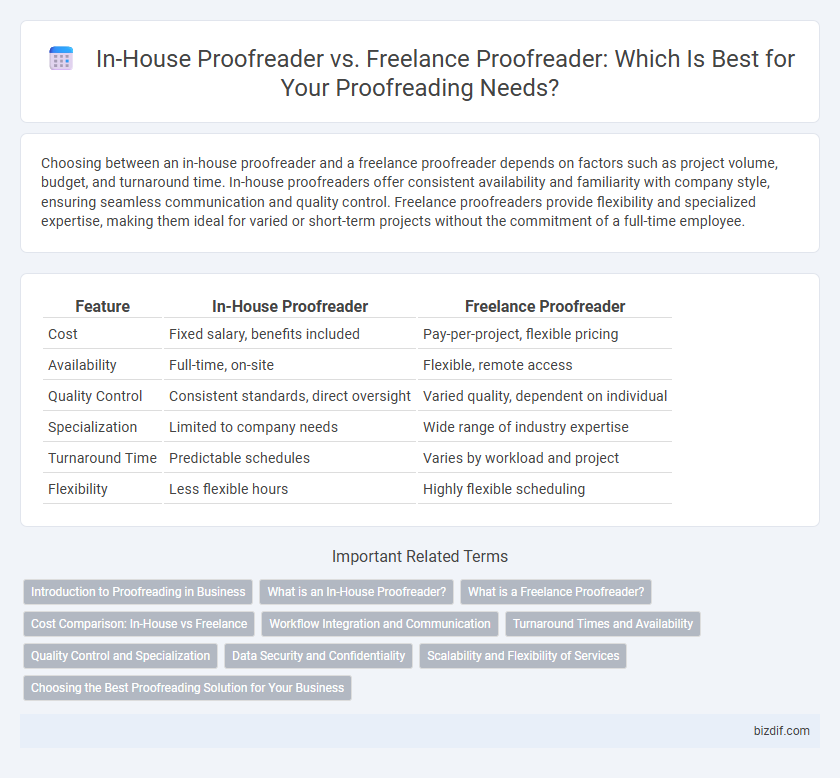Choosing between an in-house proofreader and a freelance proofreader depends on factors such as project volume, budget, and turnaround time. In-house proofreaders offer consistent availability and familiarity with company style, ensuring seamless communication and quality control. Freelance proofreaders provide flexibility and specialized expertise, making them ideal for varied or short-term projects without the commitment of a full-time employee.
Table of Comparison
| Feature | In-House Proofreader | Freelance Proofreader |
|---|---|---|
| Cost | Fixed salary, benefits included | Pay-per-project, flexible pricing |
| Availability | Full-time, on-site | Flexible, remote access |
| Quality Control | Consistent standards, direct oversight | Varied quality, dependent on individual |
| Specialization | Limited to company needs | Wide range of industry expertise |
| Turnaround Time | Predictable schedules | Varies by workload and project |
| Flexibility | Less flexible hours | Highly flexible scheduling |
Introduction to Proofreading in Business
In business, effective proofreading ensures error-free communication that upholds brand credibility and professionalism. In-house proofreaders offer consistent availability and deep organizational knowledge, facilitating aligned content quality across all departments. Freelance proofreaders provide flexibility and specialized expertise, allowing businesses to scale proofreading resources based on project demands and varying workloads.
What is an In-House Proofreader?
An in-house proofreader works directly within a company or publishing house, ensuring consistency and accuracy across all internal documents and publications. They collaborate closely with editors, writers, and designers to uphold the organization's style guide and maintain high-quality content. This role demands strong attention to detail, a thorough understanding of grammar and style, and the ability to meet tight deadlines consistently.
What is a Freelance Proofreader?
A freelance proofreader is a self-employed professional who reviews and corrects written content for grammar, punctuation, spelling, and formatting errors, often working remotely for various clients. They offer flexible services across multiple industries, including publishing, marketing, and academic fields, adapting to specific project requirements. Freelance proofreaders typically use specialized software and maintain strong attention to detail to ensure clarity and accuracy in all documents.
Cost Comparison: In-House vs Freelance
In-house proofreaders typically incur fixed costs such as salary, benefits, and office space, resulting in higher overall expenses for companies. Freelance proofreaders offer flexible, project-based pricing, which can lead to significant cost savings, especially for fluctuating workloads. Businesses with variable proofreading demands often find freelancers more economical due to the absence of long-term financial commitments.
Workflow Integration and Communication
In-house proofreaders benefit from seamless workflow integration through direct access to internal resources and instant communication with teams, enhancing efficiency and consistency. Freelance proofreaders rely on digital tools and structured protocols to bridge communication gaps, often requiring detailed briefs and feedback loops to maintain alignment. Effective collaboration hinges on clear expectations and timely interaction, regardless of the proofreader's employment type.
Turnaround Times and Availability
In-house proofreaders often provide faster turnaround times due to their integration within the company's workflow and immediate access to project materials. Freelance proofreaders offer flexible availability, allowing for scalable workload management but may experience delays depending on their schedule and client volume. Choosing between the two depends on prioritizing consistent availability versus rapid, embedded project responsiveness.
Quality Control and Specialization
In-house proofreaders ensure consistent quality control through direct collaboration with the editorial team and adherence to established brand guidelines. Freelance proofreaders offer specialized expertise across diverse industries, providing tailored services for niche content that may require subject-specific knowledge. Quality control in freelance work depends on selecting experienced professionals and implementing standardized review processes to maintain accuracy and reliability.
Data Security and Confidentiality
In-house proofreaders typically operate within a company's secure network, ensuring controlled access to sensitive documents and minimizing the risk of data breaches. Freelance proofreaders may use personal devices and external platforms, increasing potential vulnerabilities unless stringent confidentiality agreements and encryption tools are implemented. Organizations handling confidential information often prefer in-house professionals to maintain tighter data security and compliance with privacy regulations.
Scalability and Flexibility of Services
In-house proofreaders offer consistent quality control with easy team integration but may have limited scalability during peak workloads due to fixed staffing. Freelance proofreaders provide superior flexibility, allowing businesses to scale services up or down quickly based on project demand without long-term commitments. This adaptability makes freelancers ideal for fluctuating workflows and specialized tasks needing rapid resource adjustment.
Choosing the Best Proofreading Solution for Your Business
Selecting the best proofreading solution for your business depends on factors like project volume, budget, and turnaround time. In-house proofreaders offer consistent availability and direct collaboration, ideal for ongoing, high-volume tasks, while freelance proofreaders provide flexibility and cost-effectiveness for occasional or specialized projects. Evaluating your company's specific needs ensures optimal quality control and efficient resource allocation.
In-House Proofreader vs Freelance Proofreader Infographic

 bizdif.com
bizdif.com